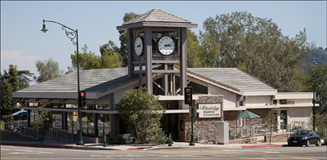Palsy
Bob Hicok
Ignoring the obvious is most of manners. Better to turn from the man
with a nose shaped like the boot
of
of Siamese twins, to the lillies,
white & flecked red, and praise
their novel arrangement
in the green vase. Now that her hands
shake, music lives in her martini,
the bright collisions of ice and glass.
I didn't see this coming in the way
I didn't see the universe coming
or my loss of hair, the limp
that's set up shop in my left hip.
It's not rude but descriptive to say
her head bobs as those tigers
in the backs of cars do or
plastic dolls dressed in the uniform
of a favorite ball club that nod
their agreement in the rear view
all the way to
lives in her signature on the bill
she snags at the bistro and insists
is hers, the pen moves
as the stylus in Ouija does,
giving a dark answer from a realm
without blood. When she lays
the tremor of her hand on my arm,
I'm reminded we all vibrate
more or less from womb to death.
Years back I'd have asked what
it's like, to be a stranger
in your body, but my greater pride
at forty's what I don't say. Anyway
truth encumbers. She might
contradict what I've decided,
might say all hopes and memories
are beaten about, that it's
like living in a tornado and not
proof of a soul so happy
to still be around it shivers.
*******************
Flemish Caroline Knox
My sister said,
“All the elements in this painting,
Still Life with Strawberries,
appear to levitate”
(by Isaak Soreau [1604–after
1638],
Flemish, early 1630’s
Gift of Mrs. Robert McKay
Cincinnati Art Museum)
DO NOT WRITE BELOW THIS LINE
__________________________________
it said on the postcard of the painting.
“I’ll tell
you how to levitate
strawberries,” said my daughter.
“Hull
with half a teaspoon of balsamic
vinegar and a teaspoon of
confectioner’s sugar; let them sit.”
strawberries,” said my daughter.
“
with half a teaspoon of balsamic
vinegar and a teaspoon of
confectioner’s sugar; let them sit.”
Still
Life with Strawberries, though,
isn’t a patch on his Carnations, Tulips, and Other Flowers in a Glass Vase with
Peaches, Grapes, and Plums in a Basket on a Ledge with Cherries, a Butter–
fly, and a Beetle.
Isaak Soreau was a twin, moreover,
and in 1652 his twin, Peter Soreau, painted Still Life of Apples, Black and
White Grapes and a Walnut in a Porcelain Bowl, Together with Chestnuts,
a Pear, Figs, Turnips, and a Melon, All on a Table with a Bunch of Snipes
Hanging on a Nail
(SLABWGWPBTCPFTMATBSHN). OhFlanders ! A Benelux country, a
Low Country. isn’t a patch on his Carnations, Tulips, and Other Flowers in a Glass Vase with
Peaches, Grapes, and Plums in a Basket on a Ledge with Cherries, a Butter–
fly, and a Beetle.
Isaak Soreau was a twin, moreover,
and in 1652 his twin, Peter Soreau, painted Still Life of Apples, Black and
White Grapes and a Walnut in a Porcelain Bowl, Together with Chestnuts,
a Pear, Figs, Turnips, and a Melon, All on a Table with a Bunch of Snipes
Hanging on a Nail
(SLABWGWPBTCPFTMATBSHN). Oh
*******************************
Two Sisters Swim in a Small Locked Box
By Malinda Markham
© 2005Portland Review Literary Journal
© 2005Portland Review Literary Journal
Sleepers dream of bandaged mouths and bright petals,
a static of bones and inelegant snow.
The night sparrow finally inhaled its own sound. What else
Could have happened? The vessel
was cardboard and twine. They should have strengthened
the moorings, should have cast
their own limbs of matter more promising
than flesh. One sleeper
mistakes a splinter for morning. The other curls
around a small jar of fear.
When the bough revoked its breaking,
the descent became nothing at all.
Two girls stood back to back, entwined.
The initial failure was a rocket-sound of wind.
****************************
Quilts Jane
Springer
Six siblings and two parentsdivided by one man's wage
equals two rooms and three beds.
My father slept between his
brothers and his father's razor
strap. Some summers he slept
in his uncle's bathtub where
his eighteen-year-old aunt asked
where he would like to touch.
My mother slept in a field when
the boards of her house swelled;
there were no electric fans
on tobacco farms in
then. Her sheets lilted over
her body with each June wind.
After they married, our parents
slept under quilts their own
mothers patched from discarded
clothes, and so their families never
left them alone: But here,
a brother's sleeve would reach
across their twin-breathed chests
as though to pass salt over a
crowded table. The dead never
do keep their hands to themselves—
and even stillborns'
empty hems cradled their toes.
********************************
Geography Lesson Chris Abani
To the Igbo everyone is family,
everything
is connected, Grandmother
explained.
Like the weave of this raffia mat,
we intertwine,
see? This is the world to the
Igbo.
Nodding, the German anthropologist
licked
her pencil in concentration and
wrote:
To the Igbo, the world is flat
like a mat.


